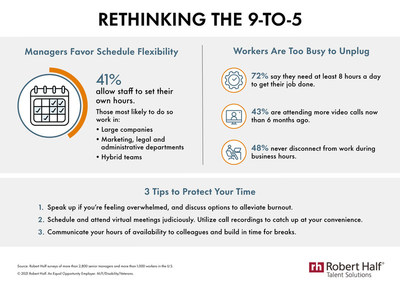Benefits
41% of Professional Staff Managers Allowing Employees To Set Their Own Hours
Managers most likely to offer flexible schedules work in large companies with 1,000 or more employees (44%); marketing (48%), legal (42%) and administrative (41%) departments; and hybrid teams, where some employees work in the office and some work.
Nov. 29, 2021

Professional services firms are embracing new ways of working, but are they ready to ditch the traditional 8-hour workday? Research from talent solutions and business consulting firm Robert Half shows just over 41% of senior managers of professional staff in finance, technology, marketing, legal, administrative support, human resources and other areas, give their employees the ability to choose when they work. And 27% of those respondents don’t mind if their direct reports put in fewer than 40 hours a week, as long as the job gets done.
Managers most likely to offer flexible schedules work in:
- Large companies with 1,000 or more employees (44%)
- Marketing (48%), legal (42%) and administrative (41%) departments
- Hybrid teams, where some employees work in the office and some work remotely (45%)
Barriers to Enjoying the Benefits
While some employees may have complete autonomy over their schedules, that doesn’t mean they’re slacking off — or reaping the rewards. Despite the newfound freedom, in a survey of more than 1,000 workers:
- 72% say they need at least 8 hours a day to get their job done.
- 43% report attending more video calls now than 6 months ago. Employees overall feel more than one-third of time spent in these meetings (34%) is wasted.
- 48% never completely disconnect from work during business hours and feel obligated to respond to messages and requests immediately, even during breaks.
View an infographic of the research highlights.
“While managers are increasingly embracing flexible schedules, they don’t always have full insight into their team members’ responsibilities and workloads,” said Robert Half senior executive director Paul McDonald. “When employees have too much on their plates, the option to work anytime can create more stress than relief.”
McDonald added, “Everyone plays a part in combatting the pressures of an ‘always-on’ culture. Workers should speak up when they feel overwhelmed and set boundaries. And leaders should promote wellness policies and programs, be empathetic to their employees’ needs, and bring in extra support when possible.”
For more ideas on offering flexibility and supporting employee well-being, visit the Robert Half blog.
The online surveys were developed by Robert Half and conducted by independent research firms. They include responses from more than 2,800 senior managers in finance, technology, marketing, legal, administrative support, human resources and other areas at companies with 20 or more employees (collected June 4 to July 1, 2021), and more than 1,000 workers 18 years of age or older (collected Aug. 12-18, 2021) in the U.S.

